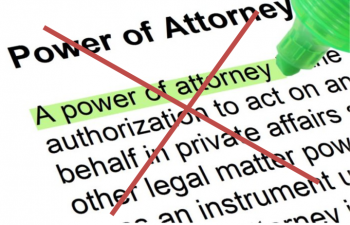How is a Power of Attorney revoked?

By granting a Power of Attorney you appoint a person or persons of your choice to manage your assets and financial affairs while you’re alive. But how do you end their authority if your circumstances change, or your relationship with your Attorney diminishes?
The NSW Powers of Attorney Act 2003 provides that, your Attorney vacates their appointment to act on your behalf if:
- the Attorney renounces the power; or
- the Attorney dies; or
- where the Attorney is a corporation, the corporation is dissolved; or
- the Attorney, by reason of any physical or mental incapacity, ceases to have the capacity to continue to act as an Attorney; or
- you lose your mental capacity, unless when you made the Power of Attorney you specifically stated it would continue (in an Enduring Power of Attorney); or
- or importantly, unless you made the Power of Attorney irrevocable, YOU revoke the appointment of your Attorney.
How to revoke your Attorney’s appointment?
There are many reasons you may wish to revoke a Power of Attorney. Your relationship with the Attorney may have altered, or your circumstances are different and the person who you appointed may no longer be appropriate for the role. You may no longer trust the person who you previously appointed, or you may have found a more suitable person to take their place. It could be that your Attorney has moved interstate or overseas and it’s no longer practical to have him or her as your Attorney. In the worst of circumstances, you may have discovered that you Attorney may have been abusing the power that you had given to them by dealing with your money and assets in an inappropriate way.
As long as you have not lost your mental capacity and you did not make an irrevocable Power of Attorney, you can revoke your Power of Attorney at any time. The most important part of revoking your Power of Attorney is to notify the Attorney that you have done so. This is because if your Attorney continues to do things on your behalf without knowing their authority has been revoked, the things they do still bind you.
If you want to revoke you Power of Attorney it may not be sufficient to merely destroy the original Power of Attorney. This is because, if the Attorney holds a properly certified copy of the Power of Attorney, this document has the same legal weight as the original.
Although a Power of Attorney can technically be revoked verbally if you tell the Attorney, in order to avoid any dispute as to whether there has been revocation, it is important that the revocation be in writing. There is no prescribed form of revocation. A document revoking a Power of Attorney should:
- be addressed to your Attorney
- state your name
- state the date of the Power of Attorney, and if it is registered, the registration number
- use the words ‘hereby revoke’
- be signed by you and dated
- preferably be witnessed by an adult.
Because you may need to prove you have revoked the Power of Attorney, the best method of notifying your Attorney is to hand it to them personally in the presence of a witness. If this is not practical, notification by registered post or email may suffice.
After the Power of Attorney is revoked, you should collect the original and any copies of the Power of Attorney, and any organisation with whom your Attorney has been dealing in their capacity as your Attorney should be notified of the revocation. If the Power of Attorney was registered, the revocation should also be registered at NSW Land Registry Service.
Can the Power of Attorney be revoked if you’ve lost mental capacity?
A General Power of Attorney automatically cancels if you suffer loss of mental capacity. However, an Enduring Power of Attorney continues notwithstanding your loss of mental capacity. Regrettably, if you no longer have mental capacity, you no longer have the capacity to revoke the Power of Attorney yourself.
However, if you become subject to Management Order under the NSW Trustee and Guardian Act, whilst your Power of Attorney is not terminated, it nonetheless becomes suspended in most circumstances.
Alternatively, an application can be made to the NSW Civil and Administrative Tribunal (NCAT) or the Supreme Court by your Guardian or any other person who in the opinion of the Court has a proper interest in the proceedings or has a genuine concern for your welfare. The Court has the power to revoke the Power of Attorney, or alternatively vary it or replace your attorney.
Conclusion
While it’s very important to choose your Attorney carefully when granting a Power of Attorney, it’s equally important to monitor that appointment closely in order that you can revoke your Attorney’s authority should their actions warrant it, or your circumstances change. Failure to do so may leave your assets and financial affairs being managed by someone you prefer did not have this role.
If you need assistance revoking an existing Power of Attorney and or preparing a new one, or are concerned that the financial affairs of one of your family members or a close friend are not being managed appropriately by their current Attorney, please contact either Lisa Delalis or John Bateman of our office on (02) 4731 5899 or email willsestates@batemanbattersby.com.au.
Download PDF Version:
How is a Power of Attorney revoked?